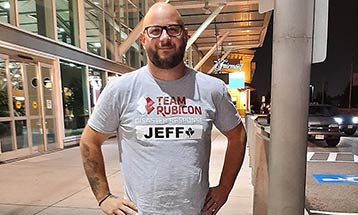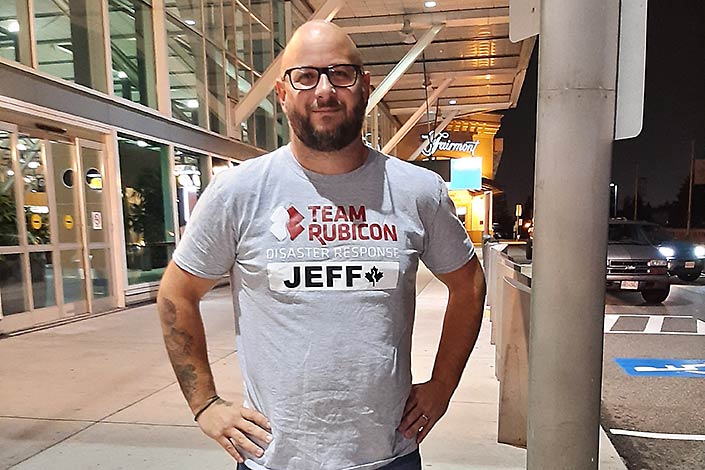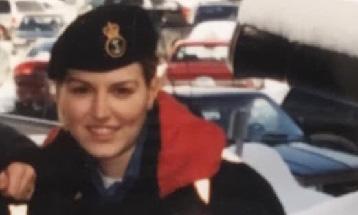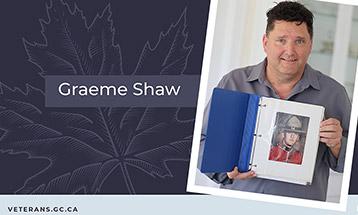Veteran Jeff Becker thinks of humanitarian service as 'soul food.' His desire to serve led him to the Canadian Armed Forces (CAF) where he spent 15 years as a Combat Engineer. Since releasing from the military in 2013, he has continued to find spiritual sustenance as a 'Greyshirt' with Team Rubicon, helping communities in the B.C. Interior, northern Ontario and even Florida recover from disasters.
A Veteran's journey
With his two grandfathers having served in the Second World War, service in the CAF made sense to Jeff. Immediately after finishing high school in 1999, he signed up at the CAF recruiting post in North Vancouver.
After basic training in Wainwright, Alberta, and then trades training as a Combat Engineer, Jeff became a full-time reservist in the 6th Build Engineer Squadron of the 1st Combat Engineering Regiment. In 2002, the regiment deployed to the former Yugoslavia as part of Operation Palladium, where Jeff’s unit assisted the combat units in landmine removal, bridge building, camp construction and other essential parts of operations.

Combat Engineer Jeff Becker in the 3rd Battalion of the Princess Patricia's Canadian Light Infantry.
Jeff also served in Kandahar, Afghanistan, in 2005 and 2006 as part of a force protection platoon attached to the 3rd Battalion of the Princess Patricia's Canadian Light Infantry.
In total, Jeff spent 15 years in the Canadian Reserves. He married wife Jessica in 2007, and together the couple welcomed their first child in 2008, a daughter named Portia.
Jeff returned to Afghanistan in 2011–2012 to train and mentor others in Kabul. Shortly after his return to Canada, he was medically released due to physical injuries and symptoms of Post-Traumatic Stress Disorder.
“I had been thinking about joining the regular forces, but my medical challenges prevented that,” he says.
He felt he had lost the structure and sense of purpose that being in service offered. “It was hard.”
It took eight months of physical rehabilitation and outpatient mental health services for Jeff to build up his capacity again, and find some balance.
“A big part of my reset was acknowledging my own physical and capacity limitations, and making peace with them.”
After finally achieving that sense of balance, Jeff went on to earn a business degree from the British Columbia Institute of Technology in Burnaby in 2014, then work in a number of different jobs in the private sector, including at a start-up craft distillery in B.C.
Though he had long left the military by then, humanitarian service remained his true passion.
Service after service
In 2018, Jeff joined Team Rubicon, an international non-profit organization that provides relief to communities affected by disasters. These can range from fires to floods to military invasion and everything in between. Team Rubicon recruits, trains, equips, organizes and deploys Veterans to aid in disaster response operations around the world. The grey Team Rubicon t-shirt that members wear on every mission has become a symbol for the organization and the moniker that volunteers have adopted for themselves: Greyshirts. Every day, they work to “earn their shirt.”
Jeff heard about Team Rubicon through the Shaping Purpose program, an organization that helps releasing Canadian Veterans find fulfilment in life after service by identifying their gifts and values, and equipping them with tools to steer the direction of their lives.
“Team Rubicon matched the cultural values of the CAF of ‘get [stuff] done’,” Jeff says.

Veteran and Team Rubicon 'Greyshirt' Jeff Becker helping to clear debris after a natural disaster in Florida.
“It’s hard to undo the CAF’s conditioning of service to others,” he explains. Team Rubicon allows him to meet this need to give back to the community.
Over the past four years, Jeff has taken part in a number of Team Rubicon missions. He spent six weeks in Pensacola, Florida, in September 2020 to help the community recover from Hurricane Sally. With his Team Rubicon teammates, Jeff removed downed trees that were blocking access to homes, tarped damaged roofs, and “mucked out” flooded homes—which means exactly what it sounds like: cleaning out the muck the floodwaters left behind, and removing flooded drywall and other debris.
On several occasions, Jeff has also joined Team Rubicon in northern Ontario to help with COVID relief, cutting firewood for isolated and quarantined people, or supporting vaccination clinics.
Contentment
Today, Jeff is a Team Rubicon provincial leader for B.C., as well as a team leader, organizing the response teams that go into disaster areas.
“It’s been a busy year in B.C.,” he said in 2022, with Team Rubicon responding to the devastating Lytton wildfire in June 2021, flooding in the Fraser Valley a few months later, and other natural disasters.
While Jeff works part time in a range of business development activities, he says his volunteer responsibilities with Team Rubicon take up a lot of his time. “It provides opportunities to help people at home in a very humanitarian context. What I get out of it is the soul food of helping, without asking for anything in return.
“I have arrived at a place of contentment with Team Rubicon. I’m grateful to be able to see my child growing up.”
Transition tips
Jeff Becker has some tips for current CAF members approaching release from service:
- Engage in the transition process early, and learn about all the programs and service you will be eligible for.
- Deal with all your health issues immediately. “You can think of that as your job for transition.”
- Take care of yourself: take the time you need to reset. “Get past the ‘go-go-go’ mentality of the forces.”
- Recognize that transition is a stressful time for all involved, including your family and friends. “It changes your identity, your sense of who you are. No more uniform. You have to make time and space to allow the transition to happen.”
Team Rubicon and Shaping Purpose have received financial support from Veterans Affairs Canada’s Veteran and Family Well-Being Fund.




